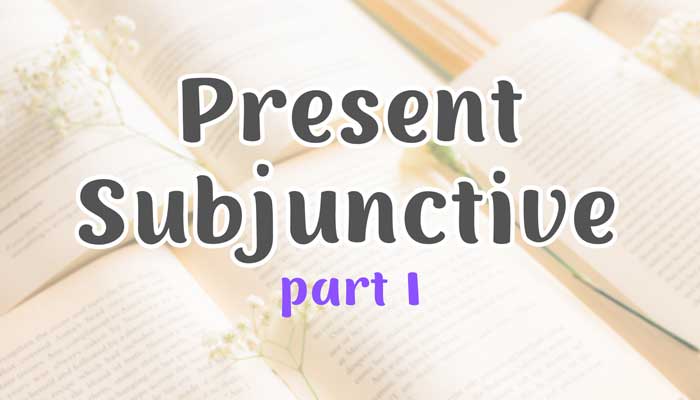Today we face a challenging task. Specifically, we need to gather all the information about a phenomenon in the grammar of the Portuguese language known as Presente do Conjuntivo (Present Subjunctive). We find ourselves at a loss for words to describe its unique meaning, so we can later act on an intuitive level. Therefore, let’s list all the rules that need to be simply memorized without questioning “why exactly this way?”
How it is formed
First, let’s find out how verb forms in Presente do Conjuntivo are created. We will rely on the verb forms in Presente do Indicativo for the pronoun “eu” (I). Let’s look at these in the table below, using regular verbs with the endings “-ar, -er, -ir” as examples:
| Infinitivo | Presente do Indicativo – “eu” |
| morar | moro |
| beber | bebo |
| abrir | abro |
To get a verb in the Presente do Conjuntivo form, we take the form of the verb from the table above, and add the endings from the tables below:
| Verbs with ending «-ar» | |
| eu | -e |
| tu | -es |
| ele, ela, você | -e |
| nós | -emos |
| eles, elas, vocês | -em |
| Verbs with ending «-er» and «-ir» | |
| eu | -a |
| tu | -as |
| ele, ela, você | -a |
| nós | -amos |
| eles, elas, vocês | -am |
“É … que …»
To begin with, we need to remember the rules for using the personal infinitive – Infinitivo Pessoal. It is used after the following construction: “É + adverb,” for example:
- É importante lavar as mãos. (It is important to wash hands.)
- É possível não comer alguns dias. (It is possible not to eat for a few days.)
However, as soon as we add the word “que,” the situation changes and we urgently need to use the Present Subjunctive (Presente do Conjuntivo).
- É importante que laves as mãos. (It is important that you wash your hands.)
- É possível que não comam alguns dias. (It is possible that they do not eat for a few days.)
In other words, the word “que” in such situations becomes a marker for us.
Special words/phrases
There is also a small list of frequently used words and phrases that also require us to apply this rule:
- embora (although), talvez (maybe), mesmo que (even if),
- ainda que (even though), nem que (even if), desde que (as long as)
- Embora eu tenha tempo para passear, fico em casa. (Although I have time to go for a walk, I stay at home.)
- Não pago, nem que chamem a polícia. (I won’t pay, even if you call the police.)
And here are some interjections that can be heard in fado texts or from the elderly generation of Portugal, which require the subjunctive mood to follow:
- Oxalá, Tomara que, Deus queira que, Quem me dera que (If only!)
- Tomara que não chova! (If only it wouldn’t rain!)
- Deus queira que passe no exame! (If only I pass the exam!)
It is not at all necessary to use these special words in your speech, but since it’s not easy to guess their meaning, it is still important to familiarize yourself with them.
Special Verbs + que
Some verbs that express specific sensations also require the subjunctive mood after them if they are followed by the word “que”. All of them express desire, command, doubt, fear, or emotion. Here they are:
agradecer (to thank), desejar (to wish), duvidar (to doubt), esperar (to hope), exigir (to demand),
gostar (to like), lamentar (to regret), pedir (to ask), preferir (to prefer), proibir (to prohibit),
querer (to want), recear (to fear), sentir (to feel), sugerir (to suggest)
Example Sentences:
- Espero que amanhã ela tenha coragem para dizer tudo. (I hope that tomorrow she has the courage to say everything.)
- Sinto muito que afinal não possas vir. (I’m sorry that in the end you cannot come.)
In these two examples, you can see that the rule for forming the Present Subjunctive works even in the case of irregular verbs in the Present Indicative: eu tenho (P.I.) – ela tenha (P.C.); eu posso (P.I.) – tu possas (P.C.). That is, exception verbs in the
Present Indicative are not necessarily so in the Present Subjunctive. The most commonly used verb from the list is “querer”.
Special expressions such as “ter dúvidas, ter medo, ter pena” also fall into this category.
- Tenho pena que ela durma pouco. (I really regret that she sleeps so little.)
- Temos medo que não ganhemos dinheiro para essa viagem. (We are afraid that we won’t earn money for this trip.)
In general, verbs that contain strong emotions require attention in this topic!
Conclusion
As students reach level B in Portuguese, they feel they are nearing the end of their grammar studies since they have already covered all the main tenses. Suddenly, they encounter the subjunctive mood, when it turns out that much of their previous speech in Portuguese was not always correct. This can be a blow to self-esteem. However, there is no need to panic. It is enough to select the most useful points of the rules and focus solely
